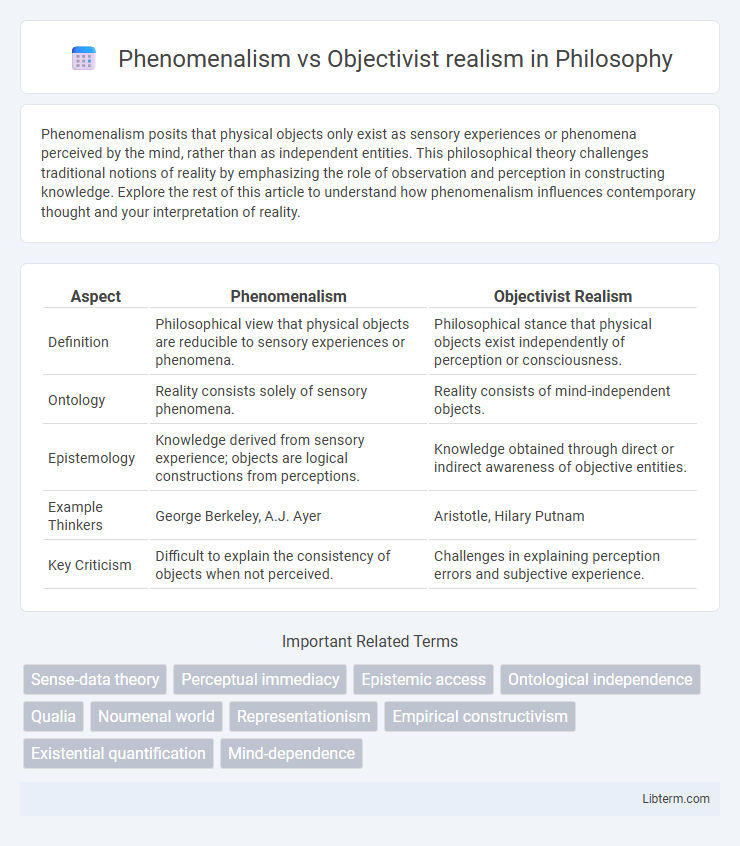Phenomenalism posits that physical objects only exist as sensory experiences or phenomena perceived by the mind, rather than as independent entities. This philosophical theory challenges traditional notions of reality by emphasizing the role of observation and perception in constructing knowledge. Explore the rest of this article to understand how phenomenalism influences contemporary thought and your interpretation of reality.
Table of Comparison
| Aspect | Phenomenalism | Objectivist Realism |
|---|---|---|
| Definition | Philosophical view that physical objects are reducible to sensory experiences or phenomena. | Philosophical stance that physical objects exist independently of perception or consciousness. |
| Ontology | Reality consists solely of sensory phenomena. | Reality consists of mind-independent objects. |
| Epistemology | Knowledge derived from sensory experience; objects are logical constructions from perceptions. | Knowledge obtained through direct or indirect awareness of objective entities. |
| Example Thinkers | George Berkeley, A.J. Ayer | Aristotle, Hilary Putnam |
| Key Criticism | Difficult to explain the consistency of objects when not perceived. | Challenges in explaining perception errors and subjective experience. |
Introduction to Phenomenalism and Objectivist Realism
Phenomenalism posits that physical objects do not exist independently of sensory experience, asserting that objects are collections of sensory phenomena perceived by observers. Objectivist realism holds that external objects exist objectively, independent of perception, and that reality consists of mind-independent entities with definite properties. These contrasting views frame key debates in epistemology and metaphysics regarding the nature of reality and human knowledge.
Historical Background and Philosophical Roots
Phenomenalism originated in the early 19th century, influenced heavily by the empiricism of David Hume and the idealism of George Berkeley, positing that physical objects are reducible to sensory experiences or phenomena. Objectivist realism traces its roots to classical philosophy, particularly Aristotle's assertion of an external reality existing independently of perception, reinforced by the scientific revolution emphasizing objective observation and empirical verification. Both philosophies address the nature of reality, but while phenomenalism centers on human perception as the basis of existence, objectivist realism maintains an ontological commitment to a mind-independent world.
Core Principles of Phenomenalism
Phenomenalism posits that physical objects do not exist independently but are logical constructions of sensory experiences or phenomena. Core principles include the assertion that statements about physical objects can be reduced to statements about actual or possible sensory experiences, emphasizing perception as foundational. In contrast, Objectivist realism maintains that objects exist independently of perception, with an objective reality accessible through reason and observation.
Key Tenets of Objectivist Realism
Objectivist realism asserts that reality exists independently of human perception, emphasizing the existence of objective facts and entities regardless of individual beliefs or experiences. It holds that the natural world has an absolute structure that can be discovered through empirical observation and logical analysis. This contrasts with phenomenalism, which claims that physical objects only exist as sensory phenomena within the mind.
Perception and Reality: Contrasting Views
Phenomenalism asserts that objects only exist as sensory phenomena perceived by minds, emphasizing perception as the foundation of reality. Objectivist realism contends that objects possess an independent existence and intrinsic properties regardless of observation, grounding reality in a mind-independent world. This fundamental distinction highlights how Phenomenalism ties reality to perceptual experience, whereas Objectivist realism upholds the existence of an objective reality beyond human perception.
Arguments in Favor of Phenomenalism
Phenomenalism argues that physical objects are logical constructions out of sensory experiences, making perception the basis of reality, which addresses the problem of how we can know anything beyond our own experiences. It avoids metaphysical assumptions by reducing objects to sensory phenomena, thus providing a parsimonious explanation that aligns with empirical science. This view also accounts for the variability of perception among observers, emphasizing that object existence depends on being perceived or potentially perceived.
Criticisms of Phenomenalism
Phenomenalism faces criticism for its reliance on sensory experiences as the basis for reality, which critics argue leads to solipsism and undermines the existence of an objective external world. Objectivist realism counters by asserting that objects exist independently of perception, providing a more stable ontology that accommodates empirical testing and scientific inquiry. The philosophical challenge for phenomenalism lies in explaining the consistency and persistence of objects beyond subjective experience.
Strengths of Objectivist Realism
Objectivist realism asserts that an external world exists independently of human perception, providing a stable and consistent reality that can be studied and verified through empirical observation. This ontological commitment enables reliable scientific inquiry and technological advancement by grounding knowledge in objective facts rather than subjective experiences. The strength of objectivist realism lies in its capacity to facilitate clear communication, predictive accuracy, and the accumulation of universally valid knowledge across diverse contexts.
Major Critiques of Objectivist Realism
Objectivist realism faces major critiques for its assumption that reality exists independent of perception, overlooking the role of the observer in constructing knowledge. Critics argue that it inadequately addresses subjective experience, leading to an incomplete understanding of phenomena. This philosophical stance is challenged by phenomenalism, which posits that objects are fundamentally tied to sensory perceptions and cognitive processes.
Conclusion: Comparing Philosophical Impact
Phenomenalism emphasizes the primacy of sensory experiences as the basis of knowledge, challenging the notion of an independently existing external world, while Objectivist realism asserts the existence of a reality independent of perception, anchoring truth in objective facts. The philosophical impact of Phenomenalism lies in its influence on epistemology and the understanding of perception, contributing to debates on the limits of human knowledge. Objectivist realism's impact is significant in grounding scientific inquiry and ethical frameworks on observable reality, reinforcing the idea that reality exists irrespective of human observation or belief.
Phenomenalism Infographic

 libterm.com
libterm.com